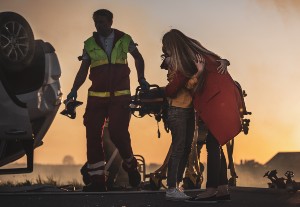
Portland’s I-84 is a critical eastern-western route in and out of the city, but it also has some of the most dangerous accidents. When you combine the high speeds and traffic volumes with icy winter weather, it becomes a traveler’s nightmare. Amongst the many types of collisions that happen along this route, rollover crashes are one of the deadliest.
Rizk Law talks about some of the most recent rollover crashes along I-84, why these accidents may happen in winter and how to avoid being in one.
Recent Rollover Crashes on I-84
The most recent rollover crash on Portland’s I-84, heading eastbound, occurred on February 16, 2021 and involved only a single vehicle. The Multnomah County Sheriff’s Office believes the winter weather played a major role in the incident. Fortunately, the driver was alone and sustained only minor injuries.
Two passengers involved in a rollover incident on I-84 a few months ago, on November 24, 2020, were not so lucky. This rollover crash killed two passengers. The rollover, which happened at 2:30 a.m., likely happened because the driver was operating his vehicle while intoxicated. The driver was later arrested on charges of manslaughter and a DUII.
Why Rollover Crashes Happen – Especially in Winter
The National Highway Traffic Safety Administration (NHTSA) reports that 6,514 rollover crashes resulted in 22,697 deaths in 2018. These numbers are lower than in previous years, due to stronger vehicles and improved safety measures. However, rollovers still account for 29 percent of motor vehicle crashes, in which occupant deaths occurred 49 percent of the time.
Type of Vehicle
While any motor vehicle can have a rollover crash, it is more common in vehicles that have a higher center of gravity, including:
- Pickup trucks
- SUVs
- Passenger vans
- Minivans
- Cargo vans
- Delivery trucks
Tripping
According to the NHTSA, tripping is one of the single most common reasons for a rollover crash (estimated to cause 95 percent of single vehicle rollover collisions). Tripping occurs when a car suddenly hits something, such as a curb, guard rail, road bump, uneven pavement or soft soil, causing a disruption in the forward motion of the vehicle and sending it into a forward or sideways roll.
Weight/Load Distribution
Overloading vehicles, especially SUVs and pickup trucks, significantly decreases vehicle stability – especially when heavy loads are put on the roof. The recommendation is to not exceed the manufacturer’s maximum load ratings. You should also place the heaviest items low to the floor and close to the center of the vehicle.
Speed
Speed increases a vehicle’s likelihood of initiating a rollover, especially when combined with other common factors, such as bad weather, heavy loads and inexperience. In approximately 40 percent of all fatal rollovers, speed is a contributing factor.
Inexperience with Top-Heavy SUVs
People who drive SUVs may not understand how the top-heavy narrower and higher chassis makes them more prone to rollovers. Taking a turn too fast and too sharply is a very common cause of single SUV rollover crashes. It is important to remember that SUVs do not operate in the same way as a sedan.
Other factors that can Lead to a Rollover Crash
There are many other factors that can cause a multiple or single vehicle rollover crash, including:
- Poorly maintained tires – or tires with low tire pressure
- Traveling too fast on icy or slippery roads
- Driving while drowsy
- Driving while impaired by drugs or alcohol
- Not paying attention
- Driving while distracted
- Oversteering or turning too fast
- Not being familiar with the road
- Uneven pavement (such as roadways being repaved) or other bad road conditions
How to Avoid Being a Victim of a Rollover Crash
While avoiding a rollover crash is closely tied to following the rules of the road and obeying traffic laws, there are some additional tips that can help you to help prevent this type of accident.
Safety recommendations:
- When purchasing a car, get the newest, and safest, vehicle you can afford.
- Get to know your vehicle – not just important features like windshield wipers, but also the general feel for safe stopping, turning, and more.
- Be mindful of speed, especially in bad, icy and wet weather.
- Pay attention – whether it is reckless drivers or bad road conditions, being alert gives you a better chance to respond to a dangerous and unexpected situation.
- Leave your phone off – distracted driving can be deadly.
- Maintain your car – tires, brakes, wipers and more should be inspected and serviced regularly.
- Be mindful of poor road and weather conditions. Avoid them when you can, but if you must drive in these situations, allow more time, go slowly and create more space between you and other vehicles.
Rizk Law Provides Legal Help You Can Trust
Our experienced Portland-based car accident attorneys know this city, and we know the law. Rizk Law has recovered millions in compensation for our clients, including a $460,000 settlement for a car crash caused by a drunk driver.
If you were injured because of the reckless or negligent actions of another, we are prepared to help. We know insurance companies and the tactics they often use to reduce or deny your claim and can handle those stressful third party calls on your behalf.
Call our firm today for your free, no-obligation case review. If we represent you, there is nothing to pay up front. We do not get paid our fees unless we recover compensation for you.

